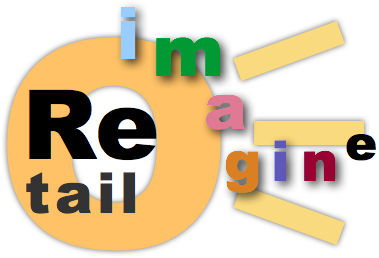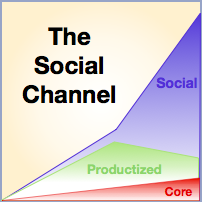 [UPDATED] The Future of the Retail Store in the Omni-Channel Age is third in CSRA’s retail & omni-channel series, and it is especially relevant to Chief Digital Officers, who orchestrate profound organization change using digital technologies and processes. It also offers rare opportunity to high-stakes CMOs. Part1 of The Future of the Retail Store outlines several aspects of market disruption that are affecting retailers as a group, albeit by varying degrees. Part2 features examples of “reimagining retail” for mobile, banking, grocery, hardware and apparel “stores.” [UPDATED] The Future of the Retail Store in the Omni-Channel Age is third in CSRA’s retail & omni-channel series, and it is especially relevant to Chief Digital Officers, who orchestrate profound organization change using digital technologies and processes. It also offers rare opportunity to high-stakes CMOs. Part1 of The Future of the Retail Store outlines several aspects of market disruption that are affecting retailers as a group, albeit by varying degrees. Part2 features examples of “reimagining retail” for mobile, banking, grocery, hardware and apparel “stores.”
“Future” provides practical examples for the main thesis carried through the series: retailers can thrive by thinking beyond “the product” and its selection, assortment, pricing, etc., because these have a decreasing impact on revenue and profit. Digital social enables customers and retailers to focus on how customers create value with products and services, so when properly used, social is a strong profit driver, and profits are what retailers need to survive and thrive. As examples illustrate, retailers can go with the “showrooming” trend by enabling customers to imagine […]
Social Channel Three: Using the Social Channel to Defend Native Markets and Penetrate Foreign Markets
 The global Social Channel will reintroduce “home court advantage” to national brands because those that use social business to compete globally by collaborating with users will have the cultural advantage; “foreign” firms may have better product features for the money, but they will not match home brands’ cultural fluency. Personalized service and attention are culturally specific, and deep cultural fluency directly correlates to intimacy. However, brands can only develop the home court advantage by practicing social business at an advanced level. Most have a long way to go and, meanwhile, they will get hammered when they persist in competing on product features in the Productized Channel of Value. The global Social Channel will reintroduce “home court advantage” to national brands because those that use social business to compete globally by collaborating with users will have the cultural advantage; “foreign” firms may have better product features for the money, but they will not match home brands’ cultural fluency. Personalized service and attention are culturally specific, and deep cultural fluency directly correlates to intimacy. However, brands can only develop the home court advantage by practicing social business at an advanced level. Most have a long way to go and, meanwhile, they will get hammered when they persist in competing on product features in the Productized Channel of Value.
The blade cuts both ways: the home court advantage will make exporting to emerging markets much more difficult in the years ahead. The Social Channel will raise the bar because users in all markets will increasingly expect brands to relate to them and to solicit their input and advice. Brands will have to invest significantly in developing in-market social […]
Social Channel Two: Understanding the Social Channel of Value by Examining Its Precedents
 Meet the Social Channel of Value, the new arena where brands compete for user (customer, client) attention and loyalty. Product features are losing their ability to differentiate because they are copied so easily. Moreover, the Social Channel of Value will transform human decision-making, organizations and institutions because it digitizes sociality, a core human trait, and its power will dwarf the power of the product and the brand. CEOs, CMOs and CPOs have a very rare social business opportunity to harness the Social Channel ahead of competitors and remake their markets. These are strong statements, but bear with me and I think you’ll appreciate why I’ve made them. Meet the Social Channel of Value, the new arena where brands compete for user (customer, client) attention and loyalty. Product features are losing their ability to differentiate because they are copied so easily. Moreover, the Social Channel of Value will transform human decision-making, organizations and institutions because it digitizes sociality, a core human trait, and its power will dwarf the power of the product and the brand. CEOs, CMOs and CPOs have a very rare social business opportunity to harness the Social Channel ahead of competitors and remake their markets. These are strong statements, but bear with me and I think you’ll appreciate why I’ve made them.
The Social Channel is the Knowledge Economy‘s analog to the Industrial Economy’s assembly line, which led to today’s brands and mass-produced products. Where the assembly line made fabrication ten times more efficient, digital social technologies will boost human communication and sociality by an order of magnitude. The “Social Channel of Value” shows how product and service features will […]
Social Channel One: Building Post-Product Relationships with Customers is how to Build Brands
 Pioneering brands are building post-product customer relationships in the social channel because they realize that product features are copied easily and serve as weak differentiators, which leads to pervasive commoditization. Moreover, people’s preferences for individualized information dealt mass media a lethal blow, and products firms will have a similar fate. Here’s why products will become extinct and how to guide your brand in building post-product customer relationships and profits. Pioneering brands are building post-product customer relationships in the social channel because they realize that product features are copied easily and serve as weak differentiators, which leads to pervasive commoditization. Moreover, people’s preferences for individualized information dealt mass media a lethal blow, and products firms will have a similar fate. Here’s why products will become extinct and how to guide your brand in building post-product customer relationships and profits.
I have predicted for years that mass customization would be the fate of “products,” and social business is bearing this out in spades, so here I’ll delve into how impersonal “products” will be rejected by customers in 5-15 years. More important, CMOs and brand stewards who appreciate this transformation will enjoy unusual advantage, and smart ones will prepare for it now. Brands that don’t get it will simply perish, and no one will even notice except their producers and vendors. Just think about the local papers and TV stations you have known.
This is Part One […]
These three examples showed how digitally produced social information could change entrenched human problems like war, excessive punishment and imprisonment and mass death by natural disaster. As such, they serve as examples of widespread change that will occur thanks to social networks and work processes. […]
The WSJ succeeded in charging for content because their content was traditionally part of their customers’ workstreams. When your livelihood depends on something, you pay. Most “news” and media entertains, it has little financial impact. […]
The example was IBM’s corporate social responsibility and green initiative. They realized it would be incongruent or unsavory to have a (physical) conference for green initiatives in which people would burn tons of CO2 getting there, so they held it in Second Life. The sales conversion ratio was equal to physical conferences. […]
Drive customer engagement and brand value by focusing on the experience of using your product or service. This is the manna of word of mouth and social computing conversations. […]
Report and analysis on the Social Networking Conference #snc2009 featured enterprise social networking managers sharing their in-the-trenches experiences and advice: Electronic Arts, Nokia, Intel, Sun, Wal-Mart, Digg, HP, Oracle, Dow Jones, Yammer, Google. Learn about how social media is unfolding in the enterprise, enterprise 2.0 […]
How Digg uses video and physical events to strengthen and grow its online community–and marketing clout: the strategy behind Diggnation, Digg Town Halls, Bigg Digg Shindiggs and Digg Meetups. […]
|
|
 [UPDATED] The Future of the Retail Store in the Omni-Channel Age is third in CSRA’s retail & omni-channel series, and it is especially relevant to Chief Digital Officers, who orchestrate profound organization change using digital technologies and processes. It also offers rare opportunity to high-stakes CMOs. Part1 of The Future of the Retail Store outlines several aspects of market disruption that are affecting retailers as a group, albeit by varying degrees. Part2 features examples of “reimagining retail” for mobile, banking, grocery, hardware and apparel “stores.”
[UPDATED] The Future of the Retail Store in the Omni-Channel Age is third in CSRA’s retail & omni-channel series, and it is especially relevant to Chief Digital Officers, who orchestrate profound organization change using digital technologies and processes. It also offers rare opportunity to high-stakes CMOs. Part1 of The Future of the Retail Store outlines several aspects of market disruption that are affecting retailers as a group, albeit by varying degrees. Part2 features examples of “reimagining retail” for mobile, banking, grocery, hardware and apparel “stores.”
 The global Social Channel will reintroduce “home court advantage” to national brands because those that use social business to compete globally by collaborating with users will have the cultural advantage; “foreign” firms may have better product features for the money, but they will not match home brands’ cultural fluency. Personalized service and attention are culturally specific, and deep cultural fluency directly correlates to intimacy. However, brands can only develop the home court advantage by practicing social business at an advanced level. Most have a long way to go and, meanwhile, they will get hammered when they persist in competing on product features in the Productized Channel of Value.
The global Social Channel will reintroduce “home court advantage” to national brands because those that use social business to compete globally by collaborating with users will have the cultural advantage; “foreign” firms may have better product features for the money, but they will not match home brands’ cultural fluency. Personalized service and attention are culturally specific, and deep cultural fluency directly correlates to intimacy. However, brands can only develop the home court advantage by practicing social business at an advanced level. Most have a long way to go and, meanwhile, they will get hammered when they persist in competing on product features in the Productized Channel of Value.